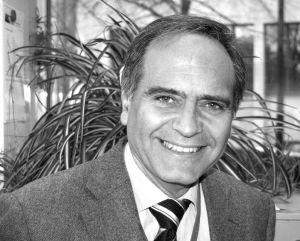|
| Biography |
| |
 From 01/10/2004 Head of the Unit Community Cooperation Activities. Directorate International Scientific Cooperation, DG Research, European Commission (EC). Budget ca 90Mio€/year
From 01/10/2004 Head of the Unit Community Cooperation Activities. Directorate International Scientific Cooperation, DG Research, European Commission (EC). Budget ca 90Mio€/year
2002-30/09/2004 Head of the Unit Biotechnology and Applied Genomics. Directorates Health and Biotechnology, Agriculture and Food, DG Research (EC). Budget ca 150Mio€/year
1999-2002 Head of the Unit The Cell Factory. Directorate Life Sciences, DG Research (EC). Budget ca. 110Mio €/year
1997-98 Head of the Unit Demonstration Projects in Life Sciences, Directorate Life Sciences and Technologies, DG Research, (EC). Budget ca.20Mio €/year
1986-97 Biotechnology Unit, Directorate Life Sciences and Technologies, DG Research (EC). Scientific and Principal Scientific Officer
1985- Associate Professor of Microbiology (tenure), Faculty of Biology, University of León (E), and Faculty of Biology, University Complutense Madrid (from 1988)
1983 Visiting Professor, Institut für Zellbiologie, Eidgenössische Technishe Hochschule (ETH), Zurich (CH)
1981-85 Associate and Assistant Professor of Microbiology, Department of Microbiology, University of León (E)
1979-81 Postdoctoral Research Fellow, John Innes Institute (Norwich, UK) with an EMBO fellowship
1975-79 Predoctoral Research Fellow, Institute of Enzymology (CSIC) - Department of Biochemistry. Faculty of Medicine, Autonomous University of Madrid
1974-75 Manager at the Chemistry R&D Department, Lever Ibérica (Unilever), Aranjuez (E)
|
| |
|
|
| |
| Abstract |
| |
|
"The International Scientific Dimension in Framework Programme 7 (2007-2013) and Success Stories from Previous Framework Programmes" |
|
|
|
The international scientific cooperation policy of the EU aims at developing cooperation to generate, share and use knowledge through equitable research partnerships taking into account the country, regional and socio-economic context and knowledge base of partner countries. The strategic approach is to enhance EU competitiveness and global sustainable development through such partnerships between the EU and third countries at bilateral, regional and global levels based on mutual interest and benefit. To this end the EU’s role as a global player is also promoted through multilateral international research programmes. The international cooperation in scientific research is tightly connected to mainstream policy issues of the EU in order to address its international commitments and to contribute to sharing European values, competitiveness, socio-economic progress and welfare under the umbrella of global sustainable development.
Specifically, International cooperation in FP7 aims to support an international Science and Technology policy that has two interdependent objectives:
To support and promote European competitiveness through strategic research partnerships with third countries including highly industrialised and emerging economies in science and technology by engaging the best third country scientists to work in and with Europe.
To address specific problems that third countries face or that have a global character, on the basis of mutual interest and mutual benefit.
With FP6 coming to its end this year and while looking ahead to FP7, some representative examples of International Scientific Cooperation in FP6 will be showcased during the talk. |
|
| |
|